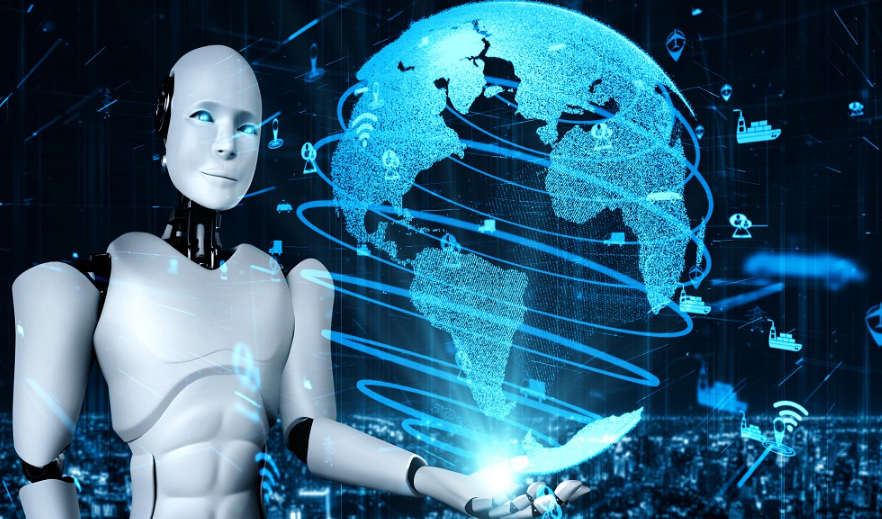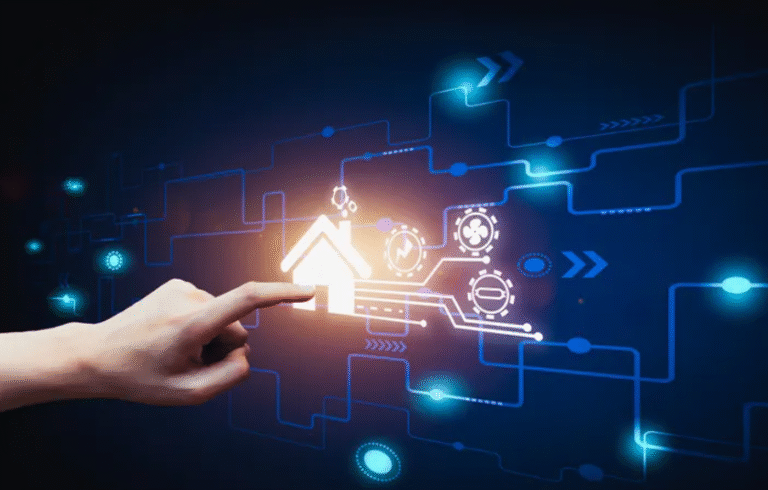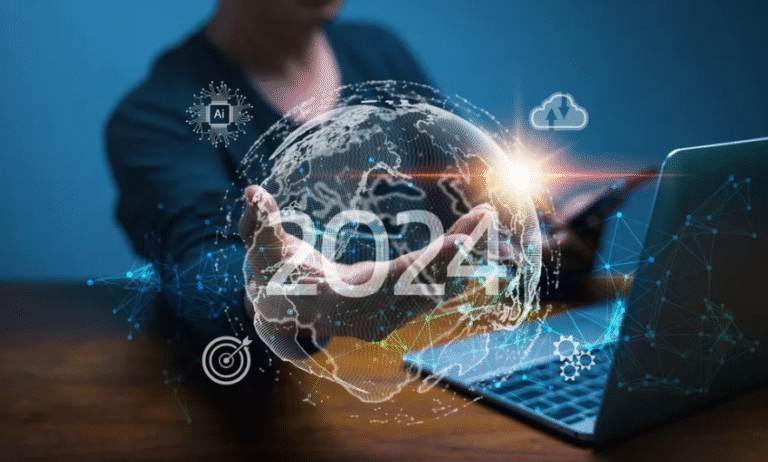Introduction: What is Artificial Intelligence?
Artificial Intelligence (AI) refers to the ability of machines to mimic human intelligence. AI systems can perform tasks that typically require human cognition, such as understanding language, recognizing patterns, making decisions, and problem-solving. In recent years, AI has become a transformative force in various industries, from healthcare and finance to education and entertainment.
As AI technology continues to advance, it holds the potential to revolutionize our world in ways we could not have imagined just a few decades ago. In this article, we will explore the future of AI and examine the ways in which it is shaping various aspects of our daily lives.
The Evolution of AI: From Its Origins to Today
AI has been in development for over half a century, but its rapid advancements in recent years have placed it at the forefront of technological innovation. Early AI systems focused on rule-based programming and solving specific problems, while today’s AI systems, such as deep learning and neural networks, are capable of learning and adapting autonomously. These developments are paving the way for more sophisticated and intelligent machines.
See also: techabbey
Early Beginnings of AI
In the mid-20th century, pioneers like Alan Turing and John McCarthy laid the groundwork for AI. Turing’s famous question, “Can machines think?” ignited a global interest in the field. McCarthy coined the term “artificial intelligence” and was instrumental in developing the first AI programming language, Lisp, which is still in use today.
AI in the Modern Era
The last decade has seen breakthroughs in machine learning (ML) and deep learning, where computers are trained using vast amounts of data to improve their performance without being explicitly programmed. This has allowed AI to excel in fields like natural language processing, image recognition, and autonomous systems. Companies like Google, Microsoft, and Tesla are pushing the boundaries of what AI can achieve, with innovations such as voice assistants, self-driving cars, and advanced robotics.
How AI is Transforming Industries
1. Healthcare: Revolutionizing Patient Care and Diagnostics
AI is dramatically improving healthcare by enabling faster diagnoses, personalized treatment plans, and more efficient drug discovery. Machine learning algorithms are now capable of analyzing medical images and identifying early signs of diseases like cancer, often with greater accuracy than human doctors.
AI is also enhancing patient care through virtual assistants, which can provide immediate assistance and personalized recommendations. Telemedicine powered by AI is expanding access to healthcare, particularly in underserved regions.
2. Finance: Automation and Smarter Decision-Making
In the financial sector, AI is streamlining operations and enhancing decision-making. Algorithms now analyze massive amounts of financial data to predict market trends and make investment decisions, helping investors minimize risks and maximize profits. AI is also improving fraud detection by spotting unusual transactions and flagging them in real-time.
Additionally, AI-driven chatbots are offering 24/7 customer support, making banking services more accessible and efficient for consumers.
3. Transportation: The Rise of Autonomous Vehicles
Autonomous vehicles are one of the most exciting developments in AI, with self-driving cars becoming more sophisticated by the day. AI enables these vehicles to navigate the streets safely by processing data from sensors and cameras to make split-second decisions in complex environments. Companies like Tesla, Waymo, and Uber are investing heavily in autonomous driving technology, which has the potential to reduce traffic accidents and improve overall road safety.
4. Education: Personalized Learning for Every Student
AI is transforming education by offering personalized learning experiences that cater to the unique needs of each student. AI-powered tutoring systems can analyze student performance and provide real-time feedback, helping students to stay on track. Moreover, AI can assist educators in identifying learning gaps and adapting their teaching methods accordingly.
In the future, AI could even play a role in automating administrative tasks, allowing teachers to focus more on the classroom experience.
5. Entertainment: AI in Content Creation and Recommendation Systems
AI is revolutionizing the entertainment industry, from content creation to user recommendations. Streaming platforms like Netflix and Spotify use AI to analyze user behavior and provide personalized recommendations, keeping audiences engaged with content they are likely to enjoy.
Moreover, AI is being used in film production to create realistic special effects and even assist in scriptwriting. In the near future, AI might even be responsible for creating entirely new forms of entertainment, like fully immersive virtual worlds or AI-generated films.
The Impact of AI on Employment and the Economy
AI and Job Displacement: A Double-Edged Sword
One of the most debated topics surrounding AI is its potential impact on employment. While AI is expected to create millions of new jobs, especially in fields like data science, AI ethics, and robotics, it also poses a threat to certain job sectors. Repetitive and manual labor-intensive jobs are the most vulnerable to automation, with machines and AI systems performing tasks more efficiently and accurately than humans.
However, history has shown that technological advancements often lead to new opportunities. For example, while the rise of the internet led to the decline of certain jobs, it also created entirely new industries and roles, such as social media management and web development.
Economic Growth Driven by AI Innovation
On the economic front, AI is expected to drive significant growth. By improving efficiency, reducing operational costs, and creating innovative new products, AI will contribute to higher productivity across various sectors. According to a report by PwC, AI could contribute up to $15.7 trillion to the global economy by 2030, making it one of the most powerful forces shaping future economic landscapes.
Ethical Considerations: Balancing Innovation with Responsibility
As AI continues to evolve, it raises several ethical questions that must be addressed to ensure that its development benefits society as a whole.
AI and Privacy Concerns
With AI systems collecting vast amounts of data, concerns around privacy and data security are paramount. AI systems have the potential to access personal information, from medical records to social media activity, which could lead to misuse or unauthorized access.
To mitigate these risks, robust privacy laws and ethical guidelines must be established to protect individuals and ensure that AI is used responsibly.
Bias and Fairness in AI Systems
AI algorithms are only as good as the data they are trained on, and if the data contains biases, the AI system will inherit those biases. This could lead to unfair or discriminatory outcomes, particularly in areas like hiring, law enforcement, and credit scoring.
To avoid these issues, it is essential to use diverse and representative datasets when training AI and to regularly audit AI systems for fairness and transparency.
The Future of AI: What Lies Ahead?
As AI continues to evolve, the possibilities for its future are endless. Some experts predict that we may reach the point of Artificial General Intelligence (AGI), where AI systems possess the ability to perform any intellectual task that a human can do. However, achieving AGI remains a long-term goal, and there are still many technical and ethical challenges to overcome.
In the short term, AI will likely become increasingly integrated into our daily lives, assisting with everything from personal health management to smart home automation. The future of AI is not just about machines replacing humans; it’s about enhancing human capabilities, making our lives more convenient, and solving some of the world’s most pressing challenges, such as climate change and disease prevention.
Frequently Asked Questions (FAQs)
1. How does AI work?
AI works by using algorithms to process large amounts of data, learning from patterns and making decisions without human intervention. AI systems are trained using supervised, unsupervised, or reinforcement learning techniques.
2. Will AI take over jobs?
While AI will automate some jobs, especially those involving repetitive tasks, it is also expected to create new roles in technology, healthcare, and other emerging industries.
3. Is AI dangerous?
AI itself is not inherently dangerous, but the way it is developed and deployed can pose risks. Ensuring ethical development and responsible usage is key to avoiding potential harm.
4. How can AI help in healthcare?
AI can improve healthcare by assisting with early diagnosis, personalized treatments, drug discovery, and patient management, ultimately leading to better health outcomes.
5. What are the ethical challenges of AI?
AI raises several ethical challenges, such as ensuring privacy, reducing bias, and maintaining transparency. Proper regulations and guidelines are necessary to address these issues.
6. What is the future of AI?
The future of AI involves creating more intelligent systems that can perform complex tasks, potentially leading to innovations in autonomous systems, healthcare, and environmental sustainability.
Conclusion
AI is already changing the way we live and work, and its potential for future innovation is boundless. From revolutionizing industries to creating new opportunities and solving complex global challenges, AI is shaping the future in profound ways. However, as we continue to embrace this transformative technology, it is essential that we address the ethical and societal implications to ensure a future where AI benefits all of humanity.



